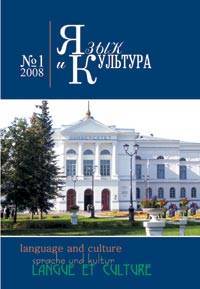The nature-activity approach in the teaching of foreign language to pre-school children
The article deals with the concept of nature-activity approach in foreign language teaching. The educational approaches depend on changing socioeconomic conditions and a type of society. There are changes in society, also there are changes in educational approaches: traditional, gender, cultural, civilizational, sociocultural, axiological, synergetic, system, competence-based, philosophic-anthropological, environmental, person-centered, situation-centered, activity-centered, differentiated, system-activity, etc. This research is methodologi-caly based on the nature-aligned approach, communicative-cognitive approach, system-activity approach, information-value approach and competence-based approach. Due to the awakening of human connection with the nature is become obvious the importance, originality, topicality of nature-activity approach in foreign language teaching of preschoolers. The humanitarian learning is becoming an important component of the development of modern information-oriented society. The present and the future of everybody depend on the developing connection of "human and nature". The ecological consciousness and ecological culture are determined the way of a future human developing. The nature-activity approach means a formation and an implementation of learning-educational process, leading to the development established by nature of a holistic comprehension, in which the development of the pupils' identity based on the nature-creative activity, that aimed at transformation of inner world and the outside material world as a whole self-organized open system, that provides preschool and primary education's continuity where training in a foreign language isn't a purpose, but a learning style of the around world and understanding of themselves as a part of the nature, and a knowledge is as a result of a subject creative activity. The authors outline the main principles of the nature-activity approach: nature-aliged, valeological and ecohumanitarien. The common-didactic and specific-methodic principles of foreign language teaching of preschoolers are based on the nature-activity approach. The common-didactic principles of foreign language teaching of preschoolers are the co-creation, adaptation, vibe, animativeness, communication with nature. The specific-methodic principles of foreign language teaching of preschoolers are nature-aligned originality, elements' interrelation of ecohumanitarien competence, genetically determined way of cognition, factor of the first language, value-communicative orientation, differential-integrated learning. The article deals with the specific features of implementation of the nature-activity approach in foreign language teaching of preschoolers. The necessity of formation of children's holistic comprehension, ecological consciousness and creative potential in teaching of foreign language is outlined. The article argues that creative process should become the norm of any educational activity. New educational standards demand the use of more productive methods of children's training of knowledge' acquiring and mastering new skills in a foreign language. The nature-activity approach in foreign language teaching of preschoolers reflects the features of modern society, considers the development's problems of society and conforms to state educational standards.
Keywords
дошкольное образование, обучение иностранному языку, природа-деятельностный подход, принципы природа-деятель-ностного подхода, общедидактические принципы, частнометодические принципы, preschool education, foreign language teaching, nature-activity approach, principles of the nature-activity approach, common-didactic principles, specific-methodic principlesAuthors
| Name | Organization | |
| Sergeeva N.N. | Ural State Pedagogical University | snata-lia2016@mail.ru |
| Kopylova E. V. | Perm State Agrotechnology University | l.kopylova079@yandex.ru |
References

The nature-activity approach in the teaching of foreign language to pre-school children | Yazyk i Kultura – Language and Culture. 2017. № 40. DOI: 10.17223/19996195/40/19
